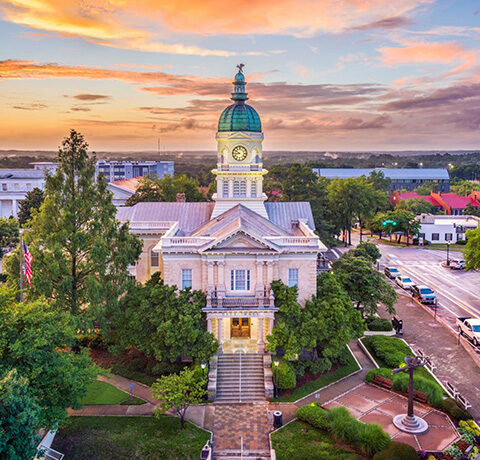This article originally appeared in the Fall 2016 edition of the Georgia Political Review
By Rob Oldham
Open your eyes next time you are north of Broad Street on a Thursday evening. Watch as sweaty Greeks stumble from their socials, nervous freshmen fidget with their fake IDs, and newly-minted binge drinkers hold in their vomit until the next trashcan appears. Under the watchful eyes of homeless panhandlers and hopeless preachers, UGA students are celebrating another successful night downtown, a rite-of-passage that, for better or worse, is ingrained in our university’s culture. Downtown Athens has over 120 establishments that serve alcohol, and “going out” is one of the defining features of the UGA experience. But the students at the bars are much different than the ones on campus. Although it might be difficult for the average bar-goer to pick up on, a sober observer will see that the students who go downtown are disproportionately white.
When Kenny Cochran first came to UGA, older black students told him that “downtown isn’t really the place for us.” Cochran, a senior from Atlanta studying finance and marketing, saw what they meant when he and one of his black friends were turned down from Jerzees Sportsbar for violating the dress code. Cochran had a hood attached to his jacket and his friend was wearing tennis shoes. Later, Cochran saw another one of his black friends turned down by a Silver Dollar bouncer who thought his ID was fake. After Cochran’s friend had the police verify that the ID was legitimate, the bouncer followed him into the bar and forced him to leave.
“The racism is real,” said former UGA student Gary McWhorter. Bouncers target black students (and black people in general) through selective enforcement of dress codes. These codes often single out clothing popular in black culture such as Nike’s Jordan brand sneakers. Bouncers also exclude black patrons by falsely claiming that bars are hosting private events and by enforcing fake ID rules more stringently for blacks. UGA’s Student Government Association (SGA) collected 50 anonymous testimonials last year in which students spoke freely about instances when they had been discriminated against. Most of the accounts were from black students denied entry into bars due to dress codes.
Bars discriminate for a variety of reasons. Athens local Anthony Huff says that it is due to assumptions about class. Bouncers use race and attire to gauge how much money someone will spend inside the bars. This is particularly directed at black locals like Huff who are broadly categorized as “troublemakers.” But black students face similar obstacles. This is partially due to the stereotype that minorities do not drink as much as whites or tip as generously. Bars also try to cater to their target audience (usually white students) and make decisions based on who they think will fit in socially with the majority of bar patrons. UGA’s Greek Life is prominent in much of the downtown scene and, because it is historically white, bars try to be accommodating to that audience, often at the expense of minorities.
Black students have responded to the alleged discrimination by largely ignoring the bar scene. Aja Muray and Jasmine Goolsby are two black students who go downtown occasionally. But they say their behavior is not common among black students at UGA. The black community more often arranges private house parties or kick-backs, where black students may feel more accepted than in downtown.
Addressing bar discrimination is difficult though. For one thing, it is highly uncertain whether Title II of the 1964 Civil Rights Act, which generally bans discrimination in places of public accommodation, applies to bars. It lists “restaurants” as a place of public accommodation, but limits the definition to those “principally engaged in selling food for consumption on the premises.” Several federal courts have ruled in favor of bar owners being sued for discrimination precisely because of this definition. Racial discrimination cannot be addressed at the state level either because Georgia is one of the few states without codified civil rights protections.
Because of the federal and state limitations, a local ordinance would be most palatable. Acting in response to an incident at General Beauregard’s, where an alcoholic beverage was named after a racial slur, the 2015-2016 SGA Cabinet recommended that the Athens-Clarke County Commission pass a nondiscrimination ordinance. County Attorney Bill Berryman drew up a proposal that would make violations of federal, state, and local anti-discrimination laws grounds for the suspension of a liquor license and would also require bars to post their dress codes outside and keep records of private events. Mayor Nancy Denson agreed to discuss the proposal at the Commission’s September 2016 meeting, but then removed it from the agenda due to opposition within the commission. Mayor Denson says that she does not know when, or if, the ordinance will be brought forward again.
Much of the opposition to the current proposal comes from those who do not think the ordinance goes far enough. Progressives say its coverage is too narrow as it would only apply to businesses that make more than 50 percent of their revenue from alcohol. They also want to establish a civil rights commission that could collect data on discrimination in Athens and make recommendations on how to address it. Former SGA Senator Andrew Roberts, a leading advocate for addressing downtown discrimination, worries that the ordinance might be toothless if it only punishes violations of existing anti-discrimination law, because, as noted, Title II may not cover bars and Georgia law does not cover race.
The ordinance also fails to protect members of the LGBT community, who are not covered by anti-discrimination law at the federal or state level. LGBT students were also included in the SGA’s collection of testimonials, with one saying he was denied at Double Barrel when the bouncer said “we don’t let fags in here.” Former SGA Director of Policy Dustin Sammons, another advocate for ending bar discrimination, says that he hopes the ordinance will “bring protections in Athens to make up for gaps in federal and state law.”
Cochran has a different idea about how to address discrimination. He wants bars to change their business models to be more inclusive. He says they should hire more minorities, welcome athletes (which will draw in more black students), and begin serving food to address the belief of many bar owners that minorities do not buy alcohol. He thinks these solutions will create a natural environment for diverse groups of people to connect.
In general, Cochran worries about the implications of a racially homogeneous downtown scene because there are already too few opportunities for cross-cultural interaction at UGA. His concerns fit into the larger picture of segregation in the United States. Americans are increasingly moving to areas where people look and think like them, a phenomenon known as “The Big Sort.” Colleges are supposed to hedge against this uniformity of race and thought, but they often fail to do so. Historically white fraternities and sororities are commonly criticized for promoting race and class-based segregation. California State University recently faced pushback for creating a dorm that is “black-themed,” although it encourages anyone who is interested in black culture to live there.
UGA is 75 percent white, but the enrollment of minority students is increasing each year. If not addressed, racial and ethnic isolation will diminish the ability of students to interact with an increasingly diverse community and escape their cultural comfort zones. When asked whether integrating downtown Athens— better known for its debauchery than its social healing powers— is the solution to bridging the racial gap at UGA, Cochran responded: “Downtown could be a solution.” Then he started laughing. “But I definitely wouldn’t put all of my eggs in that basket.”


